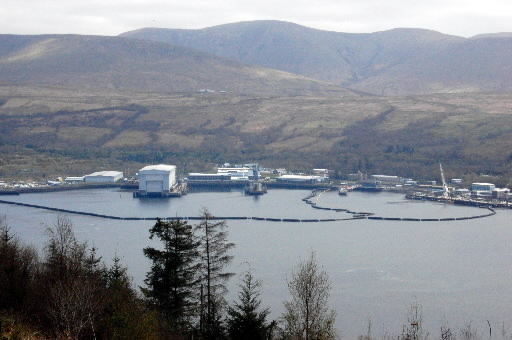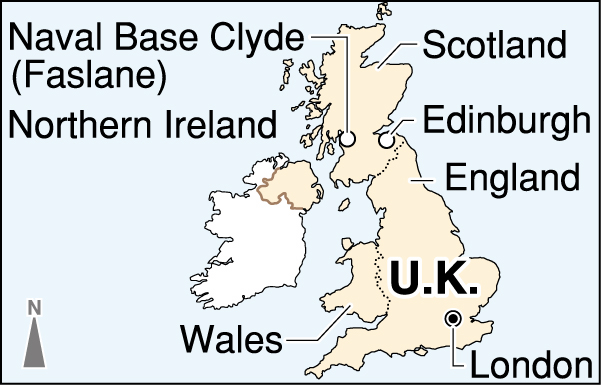Nuclear weapons can be eliminated: Chapter 5, Part 6
Jul. 22, 2009
Chapter 5: Unseen targets in the U.K. and France
Part 6: The power of local government
by Yumi Kanazaki, Staff Writer
Home rule government seeks nuclear-free Britain
When entering Scotland’s capital of Edinburgh, once you pass through the streets of the city’s medieval World Heritage site, its modern architecture appears. The Scottish Parliament Building houses the country’s legislature, which was established in 1999 when Scottish autonomy expanded.
Bruce Crawford, 54, Minister for Parliamentary Business, invited me into a room. “There is ongoing debate on what a nuclear-free Scotland will be like,” he said.
The home port of the U.K.’s four nuclear submarines, which carry Trident nuclear missiles, is at Her Majesty’s Naval Base Clyde in Faslane, Scotland. In April 2008 the Scottish government set up an investigative committee to determine the impact on employment and local industry if the nuclear submarines and nuclear weapons were to be removed from the base. Their report is to be completed this summer.
It is believed that 150 of the base employees work in nuclear weapons-related jobs. “If the tremendous amount of money that is spent to maintain the nuclear weapons were spent on regional development instead, a lot more people could be employed,” Mr. Crawford said. “Even if the nuclear weapons were removed from Scotland, the local economy wouldn’t suffer much harm.”
The Scottish National Party (SNP), a left-of-center party that currently heads the government, has pledged to seek independence from the United Kingdom and a non-nuclear Scotland as well as a security policy that calls for distancing Scotland from the North Atlantic Treaty Organization (NATO), which relies on nuclear deterrence. Scotland was an independent country until 1707, and with its history of war with England, the country has opposed the U.K.’s forcing of nuclear weapons on it.
“Even within the same party the stance of those in the British and Scottish parliaments differ,” said Malcolm Chisholm, 50, a member of the Labour Party, which holds the most seats in the Scottish Parliament after the SNP. Mr. Chisholm has expressed his opposition to the nuclear policies of the administration of British Prime Minister Gordon Brown.
In June 2007 the Scottish Parliament passed a bill opposing the replacement of Trident, the U.K.’s nuclear capability. The vote was 71 to 16 with 39 abstentions. The majority were against building new submarines to replace the aging nuclear submarines and extending the life of the nuclear capability system.
However, Scotland’s relationship with London is complicated and delicate. The Scottish Parliament has the right to pass laws with regard to education and the judiciary but not diplomacy or security, which means Edinburgh does not have the final say on the replacement of Trident.
While acknowledging that situation, Mr. Crawford said, “We have a duty to speak up on behalf of the people of Scotland. The British government must take heed and face the reality that nuclear weapons are not necessary for security in the 21st Century.”
How much London is listening is anyone’s guess, but Scotland is spurring a growing awareness of the idea of autonomy and boosting the momentum behind global nuclear disarmament.
(Originally published on June 27, 2009)
To comment on this article, please click the link below. Comments will be moderated and posted in a timely fashion. Comments may also appear in the Chugoku Shimbun newspaper.









